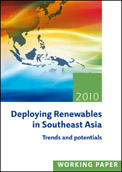1 July 2010: The International Energy Agency (IEA) has published a working paper titled “Renewables in Southeast Asian Countries: Trends and Potentials,” which provides an analysis of the constraints and opportunities to scaling up renewable energy use in the electricity, heating and transport sectors of Indonesia, Malaysia, the Philippines, Singapore, Thailand and Viet Nam.
Key […]
 1 July 2010: The International Energy Agency (IEA) has published a working paper titled “Renewables in Southeast Asian Countries: Trends and Potentials,” which provides an analysis of the constraints and opportunities to scaling up renewable energy use in the electricity, heating and transport sectors of Indonesia, Malaysia, the Philippines, Singapore, Thailand and Viet Nam.
1 July 2010: The International Energy Agency (IEA) has published a working paper titled “Renewables in Southeast Asian Countries: Trends and Potentials,” which provides an analysis of the constraints and opportunities to scaling up renewable energy use in the electricity, heating and transport sectors of Indonesia, Malaysia, the Philippines, Singapore, Thailand and Viet Nam.
Key messages of the report include that: the potential for renewables in the region is very high; the most promising technologies vary across counties; serious economic and non-economic barriers need to be overcome. These barriers include: infrastructural barriers (remoteness); lack of coordination among authorities; and lack of experience or trust amongst banks or investors. The paper includes a special focus on biofuels due to rapid and controversial recent increases in production in Southeast Asia. The report recommends the institution of strong sustainability criteria and certification schemes for biofuels.
The paper’s other key recommendations include that: market distorting fossil fuel subsidies should be removed; incentives for renewables should not disproportionately burden the poorest households; off-grid renewables should be promoted; platforms to exchange information and increase trust are needed; and renewables policies need to offer predictability, consistency and compliment climate change policies. [Executive Summary] [Full Report]